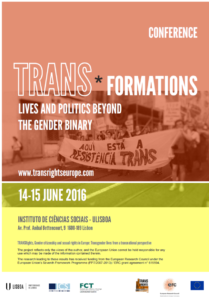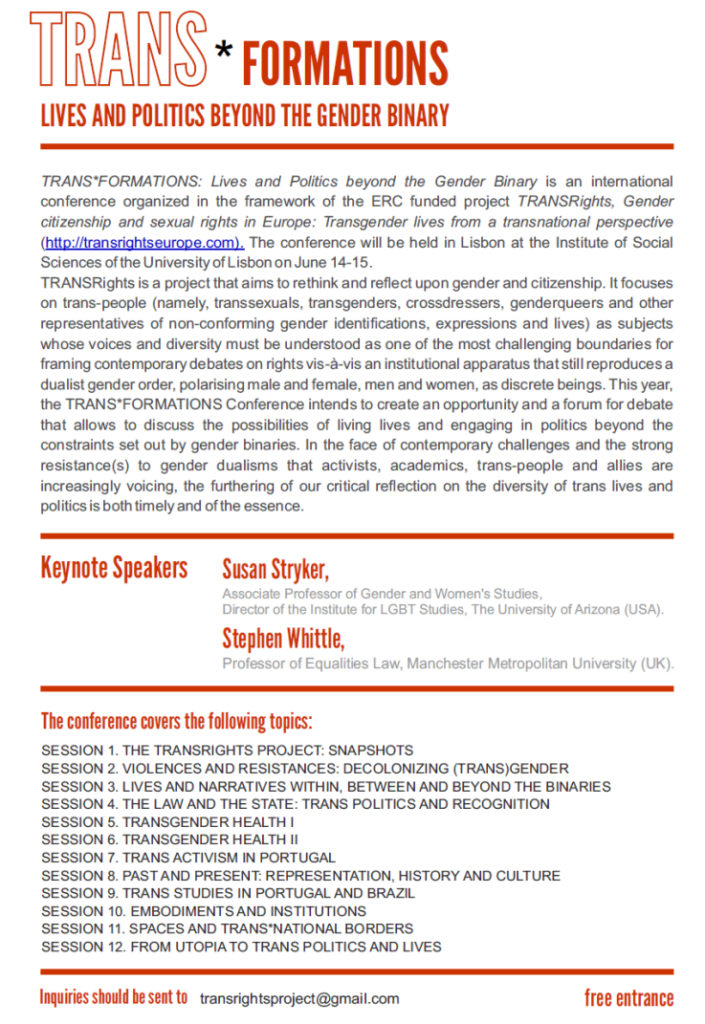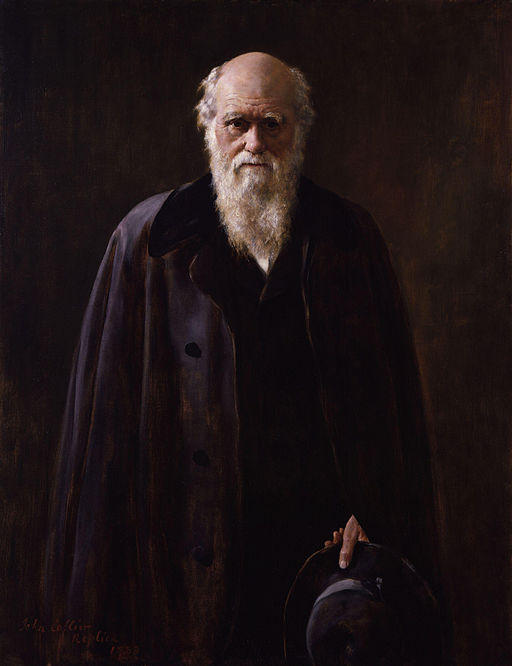 I should have announced this before, but… there is going to be an international conference on transgender issues, organized by the TRANSRIGHTS Europe project, on June 14 and 15, 2016 (from 9:30 AM to 8 PM), in Lisbon (Portugal), hosted by the Institute for Social Sciences of the Lisbon University, held at the Auditorium and the Polyvalent Room. This conference is particularly interesting because it attempts to gather all agents participating in transgender issues: starting with the transgender population itself, but including the researchers in medical and social sciences, as well as the political activists.
I should have announced this before, but… there is going to be an international conference on transgender issues, organized by the TRANSRIGHTS Europe project, on June 14 and 15, 2016 (from 9:30 AM to 8 PM), in Lisbon (Portugal), hosted by the Institute for Social Sciences of the Lisbon University, held at the Auditorium and the Polyvalent Room. This conference is particularly interesting because it attempts to gather all agents participating in transgender issues: starting with the transgender population itself, but including the researchers in medical and social sciences, as well as the political activists.
The crossdresser and transgender community — which, at least in Portugal, normally avoids these kinds of events — was especially invited by Sofia Alboim, one of the Portuguese coordinators of the project, to participate. Since one of the current hot topics in our community is its invisibility, this conference is an excellent opportunity to show that not only we do ‘exist’, but that we really need to figure out ways to fight invisibility — which also means establishing contacts and forging relationships.
Unfortunately, Portugal is not very different from the other Western countries regarding the establishment of good neighbourhood relationships between the many agents in this area. On one hand, the community, being invisible, finds the academic researchers to be an oddity; despises the doctors; and questions the good intentions of the political activists. The LGBT and transgender associations, on the other hand, are often prevented to play their role as representatives of a community… because they are unable to get in touch with that community (which remains invisible and unavailable), and, therefore, they cannot ask them about their real needs. The doctors are often mere passive agents: they are available when someone finally admits that they need help, but they do not know how to be proactive in finding people needing support. Finally, the academic researchers, in a way — and depending on their approach — may be used as a ‘link’ between all groups, but their own intentions, no matter how good they might be, are often misunderstood, thus making the community avoid them — and this sometimes even compromises the academic work due to a lack of elements that might show the incredibly complex variety and diversity of our community.
It’s hard to build these ‘bridges’. A large number of these events (congresses, seminars, workshops, presentations…) are often targeted to a very specific audience. Sometimes, it’s just the academics talking to their peers. Or doctors receiving specific training in transgender issues. Or a presentation made at Parliament or to the appropriate minister, with the purpose of raising awareness to trans* issues. But it’s rather unusual for the community itself to be invited to participate, even though they are the most interested party!
This conference might not be the best solution… but I think that they made a serious effort. The programme, rather lengthy and with an incredible amount of international speakers, shows the concern in presenting a large amount of people with widely different backgrounds and interests in this area, and it invites them to talk to each other. One predicts very interesting coffee breaks, during which we finally can meet each other — the ‘study objects’ with their researchers; the activists who fight for the rights of those who almost never show their faces; the doctors with their patients… and so forth.
Alas, we shouldn’t have too many expectations: we won’t transform society from one day to the other, just because we’re managing to get so different people seated together in the same place, talking about trans* issues. But it’s with these tiny little steps that we might eventually build something more interesting and more powerful.
I also don’t have any illusions regarding most of you reading these words of mine. Most of you will be at work, and it’s rather unlikely that you’ll drop everything and book a seat in the next low-cost flight to Lisbon. Among those who might even do just that — either because they have plenty of free time (or can get a break), most will not have the courage to show themselves in public — no matter how they present themselves. Many of you will probably confess to me in private that they ‘would love to attend, but…’. There is always a ‘but’ for most of us, and, in most cases, that ‘but’ is a very real impediment and not truly an excuse. ‘I’d love to come, but what would I tell my family…?’ ‘I’d love to go, but my friends/colleagues might recognise me on the group pictures…’ ‘I’d love to attend, but I don’t have any courage to go to something like that’ (no matter if dressed as a man or as a woman). Some might even go further and say that ‘nobody has any right to know what I do in private, and it’s pointless to discuss these issues publicly’ or even, in extreme cases: ‘you’re just putting something in the spotlight that would better be kept secret instead of being publicly exposed!’
That’s all true. But there will — thankfully! — be a few of you who might have felt a certain frustration for not seeing ‘anything happening’, or, conversely, admit that a lot is being done, but everybody is closed in their own microcosmos, not willing to talk with ‘the others’ because ‘they wouldn’t understand us anyway, therefore it’s a waste of time to talk to them.’ Maybe they’re right. However, in my personal experience, it’s through dialogue that we solve issues.
I’ll be at the conference, totally aware that most people there will not agree with me in a lot of points. That’s fine — nobody will attend the conference with the express purpose of imposing their ideas to others. On the contrary: one attends such conferences with the intention of exposing one’s views, debate it, exchange opinions, see what is common across those ideas but also — more importantly! — agreeing to the right to be different. But that requires people meeting together, talking to each other. Even if after two days nobody has changed a single iota of their own ideas and behaviour, that’s fine as well: the time was not wasted. At the very least, we will have learned how the ‘others’ think: instead of speculating about how they feel about certain issues, we will be able to hear their opinions in person, unfiltered. And, of course, we may absolutely disagree with such opinions. But at least we will know what they are. And that’s what’s important in a conference like this one.
To encourage participation in the conference, this event is completely free of charge — there is no financial obstacle to participation (of course, you’ll still have to pay for the travel expenses!). The official language of this international conference is naturally English. And it’s needless to say that there isn’t any ‘dress code’: anyone is free to attend expressing themselves as they wish, or as they feel more comfortable, independently of their gender identity or any other criterium.
For further information about this conference, you can contact the organisation via email to [email protected].
The event’s address is: Av. Prof. Aníbal de Bettencourt, 9 — 1600-189 Lisboa (this is inside the campus of the Lisboa University)
I hope to see some of you over there 🙂
Final note: This is a free translation of the same announcement I made on the Portuguese side of my blog. Usually I never translate any of my articles — each is intended to a slightly different audience anyway — but I felt that, this time, it was worth the effort. After all, who knows, maybe some of you might be around in Lisbon by this time — in business or pleasure — and might find this even sufficiently interesting to pay a call. If not… well, June is the month by excellence for the city of Lisbon, during which there will be a lot of things happening 🙂 — so you will have a wonderful excuse to spend a few days around here 🙂





